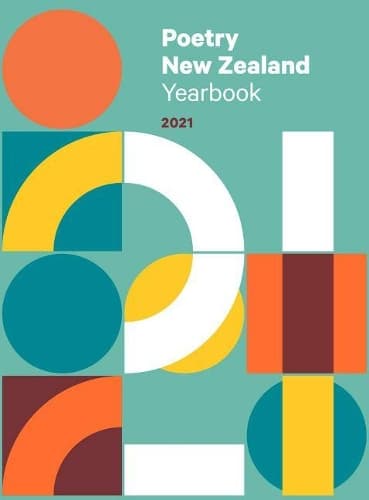Review: Poetry New Zealand Yearbook 2021
Reviewed by Harry Ricketts
The new Poetry New Zealand Yearbook is, as usual, a poetic smorgasbord. First, a tranche of impressive work by the featured poet, Aimee-Jane Anderson-O’Connor. Next, around 250 pages of poems by poets familiar and less familiar. Then, two extended personal-literary essays. Lastly, 20 substantial reviews of recent collections.
In her editorial, Tracey Slaughter rightly emphasises that this is very much a Covid volume, the pandemic and subsequent lockdowns constantly ghosting behind the work. She reminds us, too, how necessary poetry is in tough times, evoking (among others) W.H. Auden and his 1939 elegy In Memory of W.B. Yeats with its exhortation that, at “the bottom of the night”, poets should (like Yeats) “still persuade us to rejoice” and teach us “how to praise”.
However mutedly, quite a number of the poems do find moments or activities to celebrate: “What can be more important / than spinning wool, this morning?” (Pat White, Belief in impermanence); “The sea is a hymn / and it sings / for those alone” (Mark Pirie, The Lighthouse Keeper); “The tongue is / a shedding surface. We touch each / other dorsal. We love each other / mucosa,” (Aimee-Jane Anderson-O’Connor, Tongue). Sometimes the small mercies are almost undetectable like those in Adrienne Jansen’s Those old trees barely touch the grass which records with lip-tightened attention her grandfather’s obdurate reaction to no longer being able to tie his shoe-laces: “‘I’ll bloody well trip if I want to!’” Occasionally, the feeling is disarmingly straightforward, as in “I am so happy I almost forget I exist. / It is just you, and you and me” (Nikki-Lee Birdsey, Existence). Or exuberantly daffy: “good golly, my brolly has taken on a life of its own, / and joined a great shelter of umbrellas, dancing / like a Chinese dragon” (David Eggleton, The Umbrella Movement). Pippi Jean’s 11.11pm stands out amongst more bravura pieces for the assured exactness of its evocation of a small-town street scene and its possibilities: “Clouds wring / the odd star out of the dark. We’re / walking on nothing. We’re the road, unlined.”
Other poems are more preoccupied with the various “prison[s] of our days” and “the vineyard of the curse”, to borrow other phrases from Auden’s elegy. Rachael Elliott’s 1977 uncompromisingly spells out one aspect of the enduring “curse”:
if you don’t
unpeel the shriek of your victimhood
and throw it from your house
it will stagnate
gather moss and tears
Ellis Ophele’s Alomancy (Or, I Lick Salt Cubes & Call It Praying) and Soft / Soft / Soft Like A Blinking Pedestrian Crossing sound out another aspect: depression (“you’re the only thing haunting your house” – what a line!). Or, as Aimee-Jane Anderson-O’Connor puts it with surreal directness in her prose poem Asylum: “Mum told me that she knew it was time for her to come home when Superman and Jesus stopped entertaining her and started to piss her off.”
Sometimes the darker registers are further tightened by wit or undercut with irony, as in Elizabeth Morton’s remarkable If Vivaldi were under a CTO: “You drunk dial your dead friends. / You are one gerund away from defeat” (terrific). Or in Leonard Lambert’s “This is a coast well acquainted with death” (Maxwell Grove). The irony is more discombobulatingly Hardyesque in Jan FitzGerald’s unrhymed villanelle Too Far Gone, about her own near-abortion when her teenage mother was five months pregnant: “Only fifteen, she was scared for her life. / I was and wasn’t present at the time.”
Two of the edgiest and I think most admirable poems here are Janet Charman’s The House of the Talking Cat and Erik Kennedy’s Letter to James K. Baxter. These engage, from different (but not mutually exclusive) points of view, with the shocking revelation a couple of years ago that in a 1960 letter Baxter had bluntly and unapologetically admitted to raping his wife, Jacquie Sturm.
That, I hope, gives at least a taste of what this rich assortment of poems has to offer. Much more briefly, Jeffrey Paparoa Holman’s essay about creative writing in prisons, That’s the revolution: Our prisons, ourselves, and Ruth Russ’s about alternative ways of doing biography, Collage biography: Writing a life with poetical truth, both fully earn their keep and deserve to be widely read. At a time when informed, discriminating reviewing is so seriously under threat, it is good to have its value reaffirmed and demonstrated here. Janet Charman on Amy Brown’s Neon Daze and Diane Brown’s Every now and then I have another child, Jack Ross on Michele Leggott’s Mezzaluna: Selected Poems, and David Groves on Vana Manasiadis’ The Grief Almanac: A Sequel were particularly insightful and rewarding.
I’ll be carrying this book around with me for quite a while.
Reviewed by Harry Ricketts
